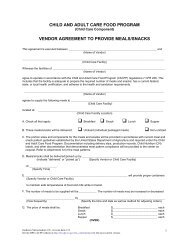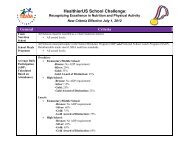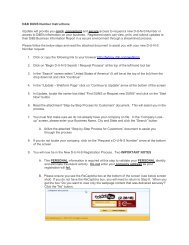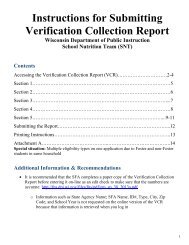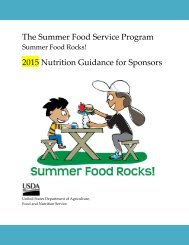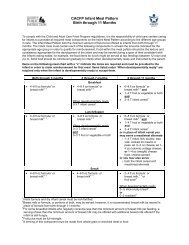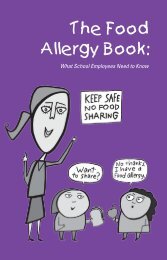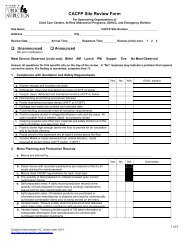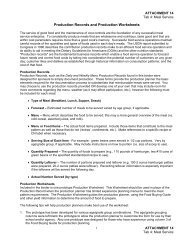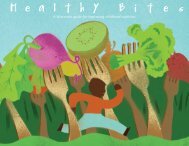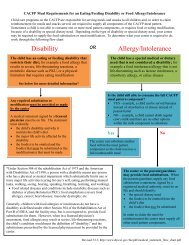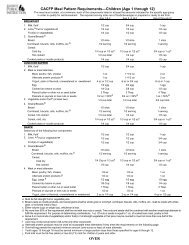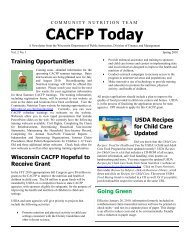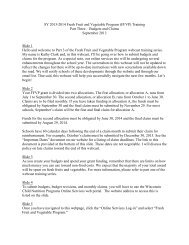Guidance Memorandum 12C - WI Child Nutrition Programs (FNS)
Guidance Memorandum 12C - WI Child Nutrition Programs (FNS)
Guidance Memorandum 12C - WI Child Nutrition Programs (FNS)
Create successful ePaper yourself
Turn your PDF publications into a flip-book with our unique Google optimized e-Paper software.
<strong>Guidance</strong> <strong>Memorandum</strong> <strong>12C</strong>: CACFP Meal Pattern Requirements4. Non-Dairy Milk SubstitutionsParents or guardians may request in writing that their child who is one year and older be served a non-dairymilk substitution without providing a medical statement. This written request must identify the medical orother special dietary need (i.e. lifestyle choice) that restricts the diet of the child, and it is recommended thatthe request also list the name of the non-dairy milk substitution to be used.The non-dairy milk substitution must be nutritionally equivalent to milk and meet the nutritional standards forfortification of calcium, protein, vitamin A, vitamin D, and other nutrients to levels found in cow’s milk, asoutlined in the National School Lunch Program (NSLP) regulations in order to be part of a reimbursablemeal. Because the <strong>Nutrition</strong> Facts Label on food products does not list all the required nutrients (seebelow), the center will need to request documentation from the product manufacturer to confirm and certifythe presence of all required nutrients at the proper level in order to claim meals served with a non-dairy milksubstitute.Non-dairy milk substitutions must at minimum, have the required levels of the listed nutrients per cup inorder to be served as part of a reimbursable meal:Milk Substitute <strong>Nutrition</strong> StandardsNutrient Per CupCalcium 276 mgProtein8 gVitamin A 500 IUVitamin D 100 IUMagnesium 24 mgPhosphorus 222 mgPotassium 349 mgRiboflavin .44 mgVitamin B-12 1.1mcg (µg)A list of specific non-dairy beverages that are approved in Wisconsin to serve as milk substitutions isavailable on the guidance memorandum website, under GM <strong>12C</strong>, under the Special Dietary Needs section.You may access this list, Fluid Milk Substitutions in the <strong>Child</strong> <strong>Nutrition</strong> <strong>Programs</strong>, by going to the direct link:http://fns.dpi.wi.gov/files/fns/pdf/fluid_milk_sub_cnp.pdf.You may utilize the Non-Dairy Beverage Calculator excel document to assist in determining if a productmeets milk nutrition standards. This can be found on the guidance memorandum website under GM <strong>12C</strong>.The direct link is http://fns.dpi.wi.gov/files/fns/xls/non_dairy_tool.xlsx.A meal containing a non-dairy milk substitution supplied by the center or parent is reimbursablewhen all of the following three conditions are met:(a) a written request from the parent for the non-dairy substitute is on file,(b) the center has documentation that the non-dairy substitute meets all the required nutrient standards asdetailed above, and(c) all other required meal components are supplied by the center and documented.Meals serving non-dairy milk substitutions that are not nutritionally equivalent to milk:These meals/snacks can only be claimed when the special dietary need is the result of a disabilitysupported by medical statement signed by a licensed physician.If required components other than a non-dairy milk substitute are supplied by the parent orguardian:A medical statement signed by a recognized medical authority supporting these parent-providedfoods must be on file and the center must supply at least one component of the child’smeals/snacks to claim them for reimbursement.Revision Date: 10/14All <strong>Guidance</strong> <strong>Memorandum</strong>s for the <strong>Child</strong> Care Component: http://fns.dpi.wi.gov/fns_centermemos8



